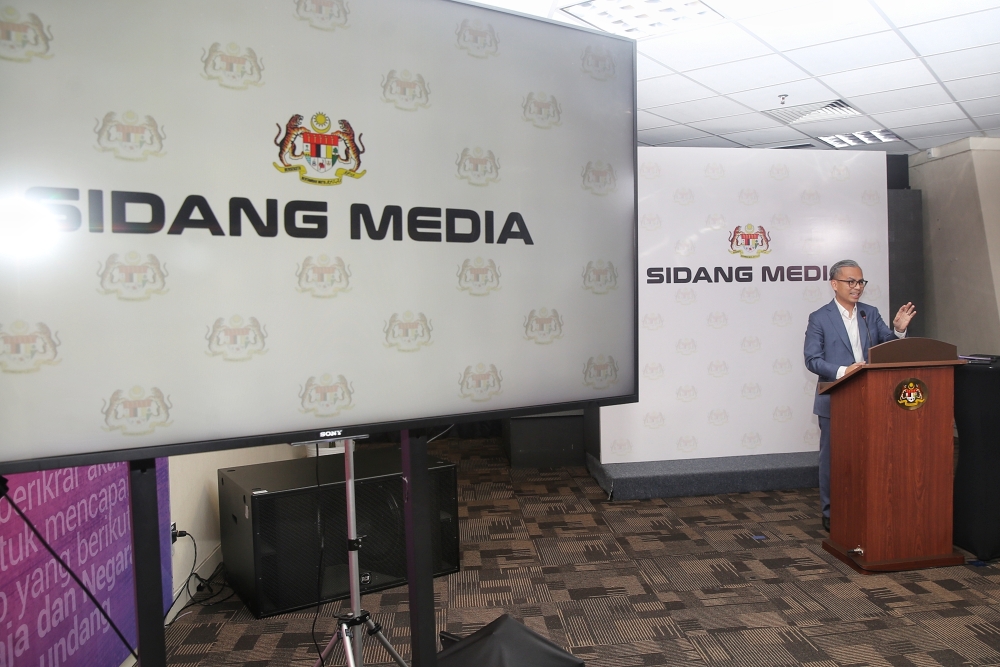KUALA LUMPUR, Dec 9 — Last week, media groups in Malaysia marched from Bukit Tugu to Parliament to hand over a memorandum to Prime Minister Datuk Seri Anwar Ibrahim.
The groups, part of a coalition called The Fourth for the Fourth (404), urged the government to clarify and repeal the rumoured amendments to the Printing Presses and Publications Act 1984 (PPPA).
The coalition, which includes journalists, media organisations, and civil society groups, is concerned that the proposed changes could lead to stricter regulations on the press. These include harsher penalties, new conditions for media operations, and tighter control over digital media.
But what are the rumoured proposed changes? Here is what we know so far, according to activists:
Regulation of digital media
The proposed amendments will purportedly expand the definition of “publication” to include digital and electronic content. This means online news portals, which currently don’t need a licence, could be required to follow the same rules as print media under the Home Ministry.
Currently, digital media falls under Section 233 of the Communications and Multimedia Act 1998 (CMA), which is enforced by the Malaysian Communications and Multimedia Commission (MCMC). This law penalises online content deemed obscene, false, or offensive.
Licence renewal for media companies
Under the new proposals, media companies may need to renew their licenses every three years. This reinstates a requirement that was removed during Datuk Seri Najib Razak’s administration between 2009 and 2018.
Najib’s government had eliminated the need for annual licence renewals, but retained the power to approve or reject new applications.
Harsher penalties
The home ministry, as reported by business paper The Edge, has proposed stricter penalties for media violations. This includes:
Up to three years’ jail or fines of up to RM100,000, or both, for breaking publication permit conditions.
Existing penalties under the PPPA already cover violations like publishing fake news, possession of prohibited publications, or printing without proper identification of the printer and publisher.
Prohibition on ‘3R’ issues
The amendments are also aimed at restricting coverage of sensitive issues involving race, religion, and royalty (3R).
While the PPPA already allows the Home Ministry to ban publications deemed “prejudicial to public order, morality, or security”, the proposed changes could explicitly prohibit 3R-related content.
This includes the power to restrict or ban imported publications that touch on 3R topics.
Concerns over the CMA amendments
In addition to the PPPA amendments, media groups have expressed concerns over proposed changes to CMA, which was tabled for its first reading by Communications Minister Fahmi Fadzil in the Dewan Rakyat.
These amendments, under review by MCMC, are viewed as a threat to digital freedoms and privacy.
Key issues include:
- Expanded MCMC powers — The amendments grant the MCMC the authority to issue directives, seize data, and search premises without warrants. Critics fear this could lead to censorship, arbitrary enforcement, and abuse of power.
- Vague terms —Terms such as “indecent,” “offensive,” and “hate speech” lack precise definitions, leaving them open to subjective interpretation. This creates a risk of misuse and arbitrary enforcement, potentially stifling legitimate forms of expression.
- Harsher penalties — Punishments for violations, including fines of up to RM1 million and imprisonment up to 10 years, are seen as disproportionate and lacking justification.
- Control over social media platforms — New rules could force social media platforms to obtain licenses and take responsibility for user-generated content, potentially leading to over-censorship and restricting online expression.

What has Putrajaya said so far?
Home Minister Datuk Seri Saifuddin Nasution Ismail had in March this year claimed that there was no attempt to amend the PPPA.
“I’ve been receiving tons of calls from the media including very senior editors asking if I was first, against the formation of the national media council and second, if we were going to amend or change the PPPA.”
“I was wondering where this rumour started or came from. It’s totally untrue. I never said we were going to do any of that in order to control the media, which is what was suggested.”
However, Prime Minister Anwar has since conceded that his administration will review criticisms towards any changes to media-related laws.
“God willing, the government, through the relevant ministry, will review all objections, criticisms, and suggestions raised to ensure a positive environment for the media industry while safeguarding their rights and freedoms.”
Meanwhile, Fahmi said the proposed changes to the CMA would enhance Malaysians’ freedom of speech by clarifying overly broad provisions, including the introduction of the term “grossly offensive”.
“We want to uphold the rights of Malaysians to freedom of speech. At the same time, we set certain boundaries and aim to clarify these boundaries.”
“From now on, satire and parody will no longer automatically be considered crimes. This means satire and parody are not crimes, but they still have their limits.”



















